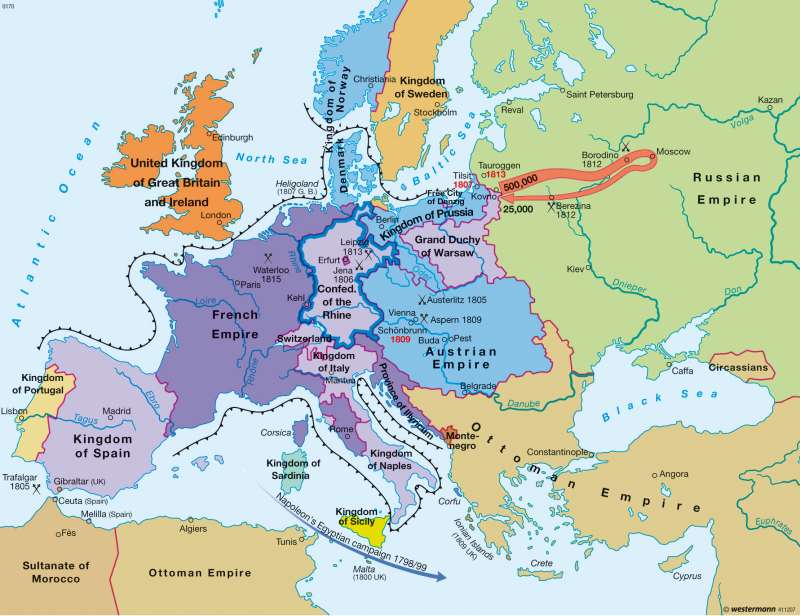The age of Napoleon circa 1812
Europe - The modern age
978-3-14-100790-9 | Page 34 | Ill. 1

Information
In 1812, the disastrous Russian campaign effectively marked the end of the era of Napoleonic rule over nearly the whole of Europe. Napoleon's rise to power began in 1796, when a poorly equipped army under his command won a stunning victory in Italy. Relying on his fame and the weakness of the ruling Directory, he launched a coup d'état and secured his election as First Consul in 1799. Shortly thereafter, he assumed the title of First Consul for Life before finally taking the throne as hereditary Emperor of the French Nation in 1804. Over the course of those years, he had successfully waged the War of the Second Coalition against Austria, Russia, Great Britain and their allies and established a stable domestic order.Napoleon also won the decisive Battle of Three Emperors at Austerlitz to end the War of the Third Coalition. The Prussian army was soundly defeated in the Battle of Jena and Auerstadt in the War of the Fourth Coalition in 1806/07. Napoleon had brought about the dissolution of the Holy Roman Empire of the German Nation by force in 1806 and founded the Confederation of the Rhine, which united all of the German territories except for Prussia and Austria. That same year, he also ordered the continental blockade against England. The alliance with Alexander I of Russia was sealed in 1807. Napoleon annexed the Netherlands in 1810 and placed his brother on the throne as king. His brothers Joseph and Jérôme ruled the Kingdoms of Spain and Westphalia, his brother-in-law Murat the Kingdom of Naples.
However, a popular uprising in Spain supported by England took place as early as 1808. The event gave rise to a long war of attrition, during which Napoleon was also compelled to launch another campaign against Austria. Once again, he emerged the victor on both fronts. That changed, however, with his decision to embark on a campaign against Russia, a venture that ended with devastating losses. While his troops managed to resist being overrun as they retreated, they were defeated by the armies of the Coalition at the Battle of the Nations at Leipzig. The allies occupied Paris in March 1814. Napoleon was forced to abdicate. His attempt to seize power again in 1815 ended at Waterloo after only 100 days.
Government reforms under Napoleon
During the first years of his reign, Napoleon reorganized not only the army but the government as well. Increased tax revenues enabled him to balance the national budget and pay off the government's debts. Even more important was the degree of social stability he achieved by introducing the Code civil. The Code civil applied in all states ruled or dominated by the French Empire under Napoleon. It had a major impact on European legislation and still remains in force in France today despite numerous changes. The draft law was revolutionary, on the one hand, but also confirmed the principles adopted in 1789. It established the principles of equality for all under the law, freedom of the individual, freedom of thought and separation of church and state. Thus it became a symbol of the Revolution in the eyes of the people of Europe, and laid the foundation for the modern government of laws. Yet it also reflected bourgeois principles in that it defined property as a natural right which took precedence over the laws of any society. The ownership of property appropriated from the nobility during the revolution by citizens and peasants was legalized.
K. Lückemeier, E. Astor; Ü: J. Southard




